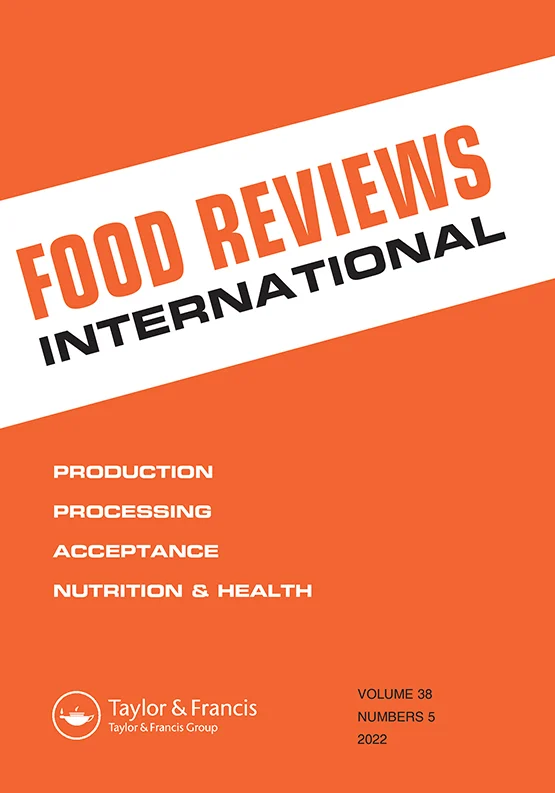葡萄汁消费对体育锻炼从业者的影响:随机临床试验的系统回顾和荟萃分析
IF 6
2区 农林科学
Q1 FOOD SCIENCE & TECHNOLOGY
引用次数: 0
摘要
摘要在临床研究中评估了葡萄汁消耗对体育锻炼从业者氧化应激、炎症、体能、肌肉损伤和恢复的影响。然而,到目前为止,还没有研究收集到这些发现。因此,我们旨在回顾所有评估葡萄汁摄入对这些标志物影响的随机临床试验(rct)。搜索的数据库是MEDLINE/PubMed, Embase®和Cochrane Central,考虑到对关键词uva或vitis的文献进行穷尽搜索。采用PRISMA指南进行和报告审查。纳入了7项随机对照试验,包括运动员(n = 3)、休闲运动员(n = 3)和低强度体育锻炼从业者(n = 1)。个别研究的定性结果存在争议,根据荟萃分析,急性或慢性饮用10/ml/kg/天或400 ml葡萄汁可改善抗氧化状态,但对体育锻炼从业者的氧化应激、炎症、身体表现、肌肉损伤和恢复指标没有影响。关键词:抗氧化剂疲劳时间运动员跑步者披露声明作者未报告潜在的利益冲突。数据和材料的可用性数据可根据要求提供。作者贡献:dbb和LMV设计了这项研究。DBB、LMV和AS对文章进行筛选和评审,提取数据并评估偏倚风险。DBB, LMV, AS, DJRG, CWS, FARB和JB分析和解释数据,撰写手稿并批准最终版本。本研究由Nível高级经济发展协调机构(CAPES)、米纳斯吉拉斯州经济发展基金会(FAPEMIG)和国家经济发展协商机构Científico e Tecnológico (CNPq)(财务法典001)资助。本文章由计算机程序翻译,如有差异,请以英文原文为准。
Effects of Grape Juice Consumption in Practitioners of Physical Activity: A Systematic Review and Meta-Analysis of Randomized Clinical Trials
ABSTRACTThe effects of grape juice consumption on oxidative stress, inflammation, physical performance, muscle damage, and recovery in physical activity practitioners were evaluated in clinical studies. However, to date, no studies have gathered these findings. Thus, we aimed to review all randomized clinical trials (RCTs) that evaluated the effects of grape juice consumption on these markers. The searched databases were MEDLINE/PubMed, Embase®, and Cochrane Central, considering an exhaustive search in the literature with keywords uva OR vitis. The PRISMA guideline was used to conduct and report the review. Seven RCTs with athletes (n = 3), recreational sportspeople (n = 3), and low-intensity physical activity practitioners (n = 1) were included. The qualitative results of the individual studies were controversial, and according to the meta-analysis, acute or chronic consumption of 10/ml/kg/day or 400 ml of grape juice improved antioxidant status but had no effects on markers of oxidative stress, inflammation, physical performance, muscle damage and recovery in physical activity practitioners.KEYWORDS: Antioxidantsexhaustion timeathletesrunners Disclosure statementNo potential conflict of interest was reported by the author(s).Availability of data and materialsData are available upon request.Authors contributionsDBB and LMV designed the study. DBB, LMV, and AS selected and reviewed the articles, extracted the data and assessed the risk of bias. DBB, LMV, AS, DJRG, CWS, FARB, and JB analyzed and interpreted the data, wrote the manuscript and approved the final version.Additional informationFundingThis study was funded by Coordenacão de Aperfeiçoamento de Pessoal de Nível Superior (CAPES), by the Fundação de Amparo à Pesquisa do Estado de Minas Gerais (FAPEMIG), and by the Conselho Nacional de Desenvolvimento Científico e Tecnológico (CNPq) (Finance Code 001).
求助全文
通过发布文献求助,成功后即可免费获取论文全文。
去求助
来源期刊

Food Reviews International
工程技术-食品科技
CiteScore
11.50
自引率
1.70%
发文量
127
审稿时长
>24 weeks
期刊介绍:
Food Reviews International presents state-of-the-art reviews concerned with food production, processing, acceptability, and nutritional values—examining the relationship of food and nutrition to health, as well as the differing problems affecting both affluent and developing nations. Offering technical solutions to critical global food dilemmas and shortages, Food Reviews International contains articles of interest for:
•food scientists and technologists
•food and cereal chemists
•chemical engineers
•agriculturists
•microbiologists
•toxicologists
•nutritionists
 求助内容:
求助内容: 应助结果提醒方式:
应助结果提醒方式:


